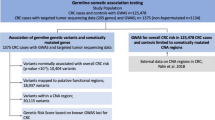Abstract
Tumorigenesis is considered as a complex process that is often driven by close interactions between germline variants and accumulated somatic mutational events. Recent studies report that some somatic copy-number alternations show such interactions by harboring germline susceptibility variants under potential selection in clonal expansions. Incorporating these interactions into genetic association approach could be valuable in not only discovering novel susceptibility variants, but providing insight into tumor heterogeneity and clinical implications. To address this need, in this article, we propose RareProb-G, an expanded version of a computational method, which is designed for identifying rare germline susceptibility variants located in the somatic allelic amplification or loss of heterozygosity regions. RareProb-G is based on a hidden Markov random field model. The interactions among germline variants and somatic events are modeled by a neighborhood system, which is bounded by a t-test on variant allelic frequencies. Each variant is assigned four hidden states, which represent the regional status and causal/neutral status, respectively. A hidden Markov model is also introduced to estimate the initial values of the hidden states and unknown model parameters. To verify this approach, we conduct a series of simulation experiments under different configurations, and RareProb-G outperforms than RareProb on both sensitivity and specificity.
Access this chapter
Tax calculation will be finalised at checkout
Purchases are for personal use only
Similar content being viewed by others
References
Wang, J., Zhao, Z., Cao, Z., et al.: A probabilistic method for identifying rare variants underlying complex traits. BMC Genomics 14(1), S11 (2013)
Geng, Y., Zhao, Z., Zhang, X., et al.: An improved burden-test pipeline for cancer sequencing data. In: Bourgeois, A., Skums, P., Wan, X., Zelikovsky, A. (eds.) Bioinformatics Research & Applications ISBRA 2016. LNCS (LNBI), vol. 9683, pp. 314–315. Springer, Cham (2016)
Bhatia, G., Bansal, V., Harismendy, O., et al.: A covering method for detecting genetic associations between rare variants and common phenotypes. PLoS Comput. Biol. 6(6), e1000954 (2010)
Sul, J., Han, B., He, D., et al.: An optimal weighted aggregated association test for identification of rare variants involved in common diseases. Genetics 188(1), 181–188 (2011)
Lu, C., Xie, M., Wendl, M., Wang, J., Mclellan, M., Leiserson, M., et al.: Patterns and functional implications of rare germline variants across 12 cancer types. Nat. Commun. 6, 10086 (2015)
The Computational Pan-Genomics Consortium: Computational pan-genomics: status, promises and challenges. Brief. Bioinf. (2016, Advance Access published). doi:10.1093/bib/bbw089
Kandoth, C., Mclellan, M., Vandin, F., et al.: Mutational landscape and significance across 12 major cancer types. Nature 502(7471), 333–339 (2013)
Ding, L., Raphael, B., Chen, F., et al.: Advances for studying clonal evolution in cancer. Cancer Lett. 340(2), 212–219 (2013)
Rahman, N.: Realizing the promise of cancer predisposition genes. Nature 505(7483), 302–308 (2014)
Dees, N., Zhang, Q., Kandoth, C., et al.: MuSiC: identifying mutational significance in cancer genomes. Genome Res. 22(8), 1589–1598 (2012)
Beckmann, J., Estivill, X., Antonarakis, S.: Copy number variants and genetic traits: closer to the resolution of phenotypic to genotypic variability. Nat. Rev. Genet. 8(8), 639–646 (2007)
Ye, K., Wang, J., Jayasinghe, R., et al.: Systematic discovery of complex indels in human cancers. Nat. Med. 22(1), 97–104 (2016)
Besag, J.: Spatial interaction and the statistical analysis of lattice systems. J. R. Stat. Soc. 36(2), 192–236 (1974)
Acknowledgement
This work is supported by the National Science Foundation of China (Grant No: 81400632), Shaanxi Science Plan Project (Grant No: 2014JM8350) and the Fundamental Research Funds for the Central Universities.
Author information
Authors and Affiliations
Corresponding author
Editor information
Editors and Affiliations
Rights and permissions
Copyright information
© 2017 Springer International Publishing AG
About this paper
Cite this paper
Geng, Y. et al. (2017). An Expanded Association Approach for Rare Germline Variants with Copy-Number Alternation. In: Rojas, I., Ortuño, F. (eds) Bioinformatics and Biomedical Engineering. IWBBIO 2017. Lecture Notes in Computer Science(), vol 10209. Springer, Cham. https://doi.org/10.1007/978-3-319-56154-7_9
Download citation
DOI: https://doi.org/10.1007/978-3-319-56154-7_9
Published:
Publisher Name: Springer, Cham
Print ISBN: 978-3-319-56153-0
Online ISBN: 978-3-319-56154-7
eBook Packages: Computer ScienceComputer Science (R0)




